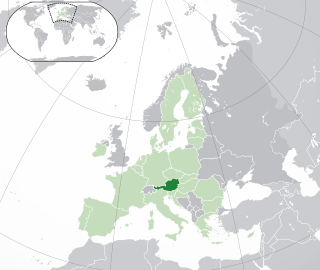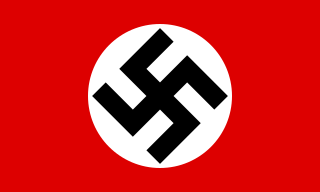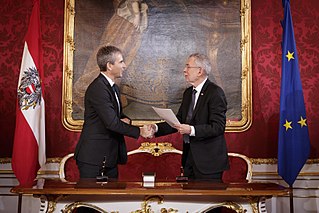
Denazification was an Allied initiative to rid German and Austrian society, culture, press, economy, judiciary, and politics of the Nazi ideology following their the Allied victory in Second World War. It was carried out by removing those who had been Nazi Party or SS members from positions of power and influence, by disbanding or rendering impotent the organizations associated with Nazism, and by trying prominent Nazis for war crimes in the Nuremberg trials of 1946. The program of denazification was launched after the end of the war and was solidified by the Potsdam Agreement in August 1945. The term denazification was first coined as a legal term in 1943 by the U.S. Pentagon, intended to be applied in a narrow sense with reference to the post-war German legal system. However, it later took on a broader meaning.
Nulla poena sine lege is a legal principle which states that one cannot be punished for doing something that is not prohibited by law. This principle is accepted and codified in modern democratic states as a basic requirement of the rule of law. It has been described as "one of the most 'widely held value-judgement[s] in the entire history of human thought'".

Bruno Kreisky was an Austrian social democratic politician who served as Foreign Minister from 1959 to 1966 and as Chancellor from 1970 to 1983. Aged 72 at the end of his chancellorship, he was the oldest Chancellor after World War II. His 13-year tenure was the longest of any Chancellor in republican Austria.

The Ministries Trial was the eleventh of the twelve trials for war crimes the U.S. authorities held in their occupation zone in Germany in Nuremberg after the end of World War II. These twelve trials were all held before U.S. military courts, not before the International Military Tribunal, but took place in the same rooms at the Palace of Justice. The twelve U.S. trials are collectively known as the "Subsequent Nuremberg Trials" or, more formally, as the "Trials of War Criminals before the Nuremberg Military Tribunals" (NMT).

Lesbian, gay, bisexual, and transgender (LGBT) rights in Austria have advanced significantly in the 21st century, and are now considered among the most developed in the world. Both male and female same-sex sexual activity are legal in Austria. Registered partnerships were introduced in 2010, giving same-sex couples some of the rights of marriage. Stepchild adoption was legalised in 2013, while full joint adoption was legalised by the Constitutional Court of Austria in January 2015. On 5 December 2017, the Austrian Constitutional Court decided to legalise same-sex marriage, and the ruling went into effect on 1 January 2019.

Wilhelm Miklas was an Austrian politician who served as President of Austria from 1928 until the Anschluss to Nazi Germany in 1938.
Volksverhetzung, in English "incitement to hatred", "incitement of popular hatred", "incitement of the masses", or "instigation of the people", is a concept in German criminal law that refers to incitement to hatred against segments of the population and refers to calls for violent or arbitrary measures against them, including assaults against the human dignity of others by insulting, maliciously maligning, or defaming segments of the population.

The Government of Austria is the executive cabinet of the Republic of Austria. It consists of the chancellor, who is the head of government, the vice chancellor and the ministers.
The Federal Republic of Germany guarantees freedom of speech, expression, and opinion to its citizens as per Article 5 of the constitution. Despite this, censorship of various materials has taken place since the Allied occupation after World War II and continues to take place in Germany in various forms due to a limiting provision in Article 5, Paragraph 2 of the constitution. In 2014 the Reporters Without Borders Press Freedom Index ranked Germany as 14th in the world in terms of press freedom. During the Allied occupation of Germany, the media was controlled by the occupying forces. The policy rationales differed among the occupying powers, but there was resentment in literary and journalistic circles in many parts of the country. Undesired publishing efforts were unilaterally blocked by the occupying forces.

Austria was part of Nazi Germany from 13 March 1938 until 27 April 1945, when Allied-occupied Austria declared independence from Nazi Germany.

The government of Nazi Germany was a totalitarian dictatorship governed by Adolf Hitler and the Nazi Party according to the Führerprinzip. Nazi Germany was established in January 1933 with the appointment of Adolf Hitler as Chancellor of Germany, followed by suspension of basic rights with the Reichstag Fire Decree and the Enabling Act which gave Hitler's regime the power to pass and enforce laws without the involvement of the Reichstag or German president, and de facto ended with Germany's surrender in World War II on 8 May 1945 and de jure ended with the Berlin Declaration on 5 June 1945.

Sixteen European countries, along with Canada and Israel, have laws against Holocaust denial. Holocaust denial is the denial of the systematic genocidal killing of approximately six million Jews in Europe by Nazi Germany in the 1930s and 1940s. Many countries also have broader laws that criminalize genocide denial. Among the countries that ban Holocaust denial, Russia, Austria, Germany, Hungary, Poland and Romania also ban other elements associated with Nazism, such as the display of Nazi symbols.
The German Strafgesetzbuch in section § 86a outlaws "use of symbols of unconstitutional organizations" outside the contexts of "art or science, research or teaching". The law does not name the individual symbols to be outlawed, and there is no official exhaustive list. However, the law has primarily been used to outlaw fascist, Nazi, communist, Islamic extremist and Russian militarist symbols. The law was adopted during the Cold War and notably affected the Communist Party of Germany, which was banned as unconstitutional in 1956, the Socialist Reich Party and several small far-right parties.

The use of flags and emblems of Nazi Germany (1933–1945) is currently subject to legal restrictions in a number of countries, such as France, Germany, Israel, Italy and Hungary.

The Freedom Party of Austria is a national-conservative, right-wing populist, political party in Austria. It has been led by Herbert Kickl since 2021. It is the third largest of five parties in the National Council, with 30 of the 183 seats, and won 16.2% of votes cast in the 2019 legislative election. It is represented in all nine state legislatures, and a member of two state cabinets. On a European level, the FPÖ is a founding member of the Identity and Democracy Party and its three Members of the European Parliament (MEPs) sit with the Identity and Democracy (ID) group.

In Austrian politics, the Federal Chancellery is the ministry led by the chancellor. Since the establishment of the First Austrian Republic in 1918, the Chancellery building has served as the venue for the sessions of the Austrian cabinet. It is located on the Ballhausplatz in the centre of Vienna, vis-à-vis the Hofburg Imperial Palace. Like Downing Street, Quai d'Orsay or – formerly – Wilhelmstrasse, the address has become a synecdoche for governmental power.

The victim theory, encapsulated in the slogan "Austria – the Nazis' first victim", was the 1949–1988 Austrian ideological basis formed by Austrians themselves under Allied occupation and independent Second Austrian Republic. According to the founders of the Second Austrian Republic, the 1938 Anschluss was an act of military aggression by the Third Reich. Austrian statehood had been interrupted and therefore the newly revived Austria of 1945 could not and should not be considered responsible for the Nazis' crimes in any way. The "victim theory" which was formed by 1949 insisted that all of the Austrians, including those who strongly supported Hitler, had been unwilling victims of the Nazi regime and were therefore not responsible for its crimes.

In Austria, a minister is a member of the Cabinet that usually leads a ministry or a division of the Chancellery.
Wilhelm Malaniuk was an Austrian judge and legal scholar.













